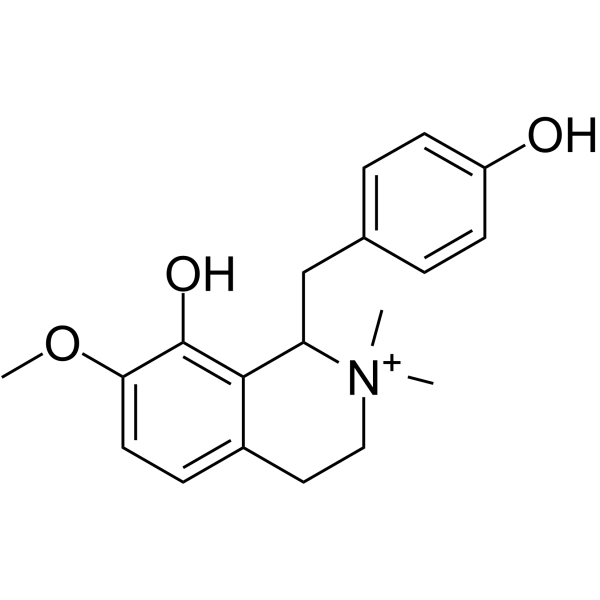
Oblongine
CAS No. 60008-01-7
Oblongine( —— )
Catalog No. M31010 CAS No. 60008-01-7
Oblongine chloride may have potential haemodynamic effects, it can cause a dose-dependent reduction of systolic and diastolic blood pressure, and that these effects are not mediated by α2-adrenergic receptor stimulation.
Purity : >98% (HPLC)
 COA
COA
 Datasheet
Datasheet
 HNMR
HNMR
 HPLC
HPLC
 MSDS
MSDS
 Handing Instructions
Handing Instructions
| Size | Price / USD | Stock | Quantity |
| 5MG | 531 | In Stock |


|
| 50MG | Get Quote | In Stock |


|
| 100MG | Get Quote | In Stock |


|
Biological Information
-
Product NameOblongine
-
NoteResearch use only, not for human use.
-
Brief DescriptionOblongine chloride may have potential haemodynamic effects, it can cause a dose-dependent reduction of systolic and diastolic blood pressure, and that these effects are not mediated by α2-adrenergic receptor stimulation.
-
DescriptionOblongine chloride may have potential haemodynamic effects, it can cause a dose-dependent reduction of systolic and diastolic blood pressure, and that these effects are not mediated by α2-adrenergic receptor stimulation.
-
In Vitro——
-
In Vivo——
-
Synonyms——
-
PathwayOthers
-
TargetOther Targets
-
Recptor——
-
Research Area——
-
Indication——
Chemical Information
-
CAS Number60008-01-7
-
Formula Weight314.4
-
Molecular FormulaC19H24NO3
-
Purity>98% (HPLC)
-
Solubility——
-
SMILES——
-
Chemical Name——
Shipping & Storage Information
-
Storage(-20℃)
-
ShippingWith Ice Pack
-
Stability≥ 2 years
Reference
molnova catalog



related products
-
Buccalin
Buccalin
-
Caulilexin C
Caulilexin C shows inhibitory activity on human Acyl CoA: cholesterol transferase I (hACATI) and on human Acyl CoA: cholesterol transferase 2 (hACAT2) at 100 mug/ml.
-
1-BENZENESULFONYL-PI...
——



 Cart
Cart
 sales@molnova.com
sales@molnova.com


